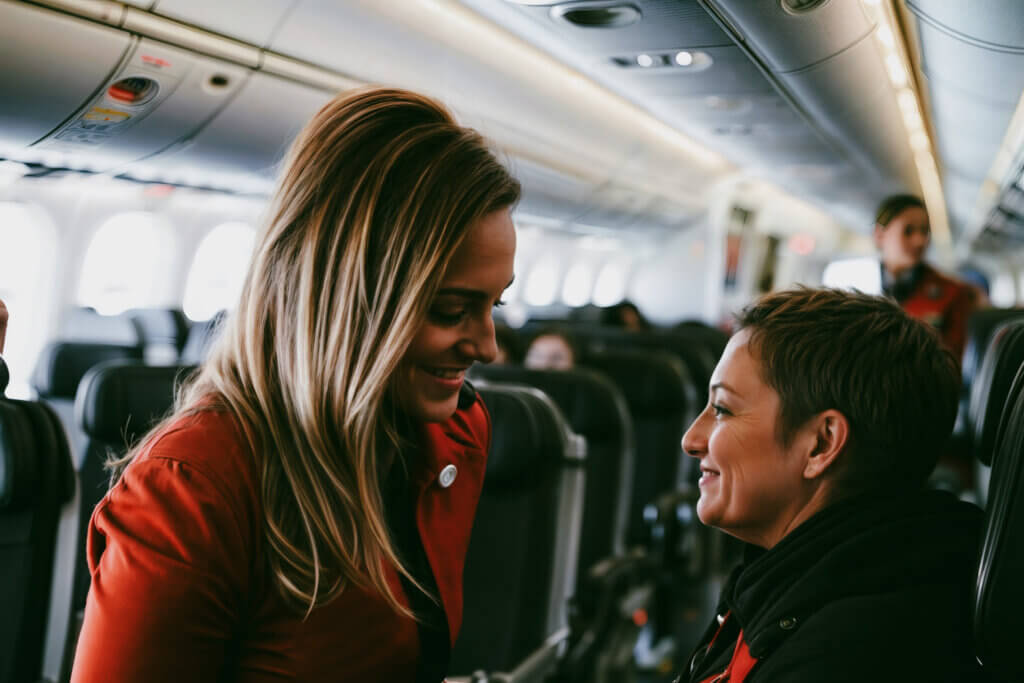Business travel opens doors to new markets, opportunities, and experiences – but it’s important to recognise that not everyone navigates the world in the same way. For some vulnerable travellers, international work trips come with added layers of complexity. Working with a TMC (travel management company) can relieve some of the additional stress.
Groups such as female travellers, LGBTQ+ individuals, and people with disabilities often face challenges that go beyond typical travel logistics. By increasing awareness of these issues, travel coordinators, colleagues, and companies can better understand what these travellers might experience on the road – and help foster a more inclusive travel culture.
Female travellers: Navigating cultural & legal norms
Solo female business travellers may face heightened scrutiny or unwanted attention in certain countries, particularly where local laws and cultural expectations around gender are strict. Something as simple as wearing clothing considered inappropriate by local standards or being seen in one-on-one interactions with men can result in uncomfortable – even risky – situations.
What to be aware of:
- In some regions, dress codes are strictly enforced
- Social norms may differ significantly from those at home
- Being alone in public can draw attention or lead to safety concerns
Understanding the local context can make a significant difference. Sharing insights and travel tips, especially from others who have travelled to the same destination, can help women feel more confident and prepared. TMC’s can also make recommendations such as vetted chauffeur transfers at night, and centrally located hotels.
LGBTQ+ travellers: Balancing identity & safety
While many parts of the world are welcoming and inclusive, others still enforce laws that criminalise same-sex relationships or gender diversity. For LGBTQ+ travellers, navigating these legal and social landscapes often requires additional discretion and planning.
Key considerations:
- Laws and societal attitudes vary widely by country – and even within countries
- Public displays of affection or open discussion about identity may be risky in some places
- Knowing where to access safe spaces or local support networks can be invaluable
Raising awareness of these complexities helps promote empathy and understanding. No traveller should have to choose between being themselves and staying safe – but sadly, that’s still a reality in many places.
Travellers with disabilities: Facing barriers beyond the physical
People with physical or sensory disabilities often encounter challenges that are less visible to others. These can range from inaccessible infrastructure to unfamiliar attitudes toward disability. This is especially prevalent in regions with limited legal protections or outdated social views.
Common challenges include:
- Lack of wheelchair-accessible transport or facilities
- Communication barriers for visually or hearing-impaired travellers
- Cultural stigma or discrimination that may affect confidence or safety
Being aware of these factors can help others better understand the resilience it takes to travel with a disability – and how important it is to plan ahead, remain adaptable, and advocate for better access and inclusion. TMC’s can support with accessible-friendly airline seating/hotel rooms, meet and greet services and/or car transfers.

Why awareness of vulnerable travellers matters
Recognising the specific risks and barriers that vulnerable travellers face is the first step toward making business travel more equitable. It’s not just about changing policies or adding checklists – it’s about listening to real experiences and acknowledging that every traveller deserves to feel safe, respected, and supported.
By raising awareness, we open the door to better conversations and more thoughtful preparation – whether that means adjusting how we plan travel, offering additional support, or simply understanding the complexities others may be dealing with.
Final thought
Everyone experiences the world differently. As business travel continues to evolve, taking the time to understand those differences helps create a culture where all travellers feel seen – not just booked. This is a responsibility for all of us – travel managers, TMCs, travellers and suppliers – by sharing feedback and knowledge we can make corporate travel easier, and safer for all.
Looking for more information for your travel policy? Speak to MIDAS Travel today about our personalised travel service.
USEFUL LINKS
- Why choose us? – MIDAS Travel Website
- Here’s how to protect the mental health of your corporate travellers – MIDAS Travel Blog
- Travel safety advice for working with vulnerable travellers – Circuit Magazine

